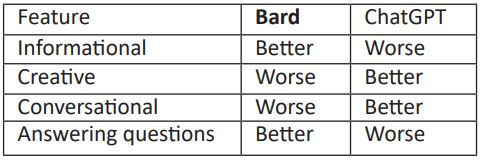Review Article - Volume 3 - Issue 4
ChatGPT versus Bard: An analysis and update
Som S Biswas*
The University of Tennessee Health Science Center, Memphis, USA.
Received Date : June 14, 2023
Accepted Date : July 11, 2023
Published Date: July 18, 2023
Copyright:© Som S Biswas 2023
*Corresponding Author : Som S Biswas, The University of Tennessee Health Science Center, Memphis, USA.
Email: ssbinmemphis@gmail.com
DOI: Doi.org/10.55920/2771-019X/1498
Abstract
Bard and ChatGPT are both large language models, but they have some key differences. In this paper we explore the same.
Introduction
ChatGPT and Bard are both large language models, also known as conversational AI or chatbot trained to be informative and comprehensive. They are trained on a massive amount of text data and are able to communicate and generate human-like text in response to a wide range of prompts and questions. For example, they can provide summaries of factual topics or create stories.
ChatGPT is a large language model chatbot developed by OpenAI. It is trained on a dataset of 300 billion words and is able to communicate and generate human-like text in response to a wide range of prompts and questions. ChatGPT is known for its ability to generate creative text formats of text content, like poems, code, scripts, musical pieces, email, letters, etc.
Bard is a large language model chatbot developed by Google AI. It is trained on a massive dataset of 1.56 trillion and is also able to communicate and generate human-like text in response to a wide range of prompts and questions. Bard is known for its ability to generate comprehensive and informative text, and to answer questions in a comprehensive and informative way [1]. Although Bard and ChatGPT are both large language models, but they have some key differences.
Data
Bard is trained on a massive dataset of text and code, while ChatGPT is trained on a smaller dataset of text. This means that Bard has access to a wider range of information and can generate more comprehensive and informative responses.
Access to the internet
Bard has access to the internet in real time, while ChatGPT does not. This means that Bard can generate responses that are up-to-date and relevant to the current moment.
Accuracy
Bard is generally more accurate than ChatGPT because it is connected to internet in real-time. This is because Bard has access to a wider range of information and can generate responses that are more comprehensive and informative.
Creativity
ChatGPT is generally more creative than Bard. This is because ChatGPT is trained on a dataset of text that is more creative in nature.
Conversational ability
Bard is generally better at carrying on conversations than ChatGPT. This is because Bard is trained on a dataset of text that is more conversational in nature.
Overall
Bard is a more comprehensive and informative language model than ChatGPT. However, ChatGPT is more creative and conversational. Ultimately, the best language model for you will depend on your specific needs.
Table 1: Summarizes the strengths and weaknesses of Bard and ChatGPT
Conclusion
Ultimately, which language model is better depends on the specific task at hand. If you need to generate text that is informative and engaging, then Bard is the better option. If you need to generate text that is creative and original, then ChatGPT is the better option. If you need to answer questions in a comprehensive and informative way, then Bard is the better option. If you need to generate text that is conversational and engaging, then ChatGPT is the better option [2].
Acknowledgments: The author acknowledges that this article was partially generated by ChatGPT (powered by OpenAI's language model, GPT-3; http://openai.com) and Bard (by Google). The editing was performed by the author.
Funding: This research did not receive any specific grant from funding agencies in the public, commercial, or not-for-profit sectors.
Data Availability: Not applicable.
Declarations: Conflict of interest No benefits in any form have been or will be received from a commercial party related directly or indirectly to the subject of this manuscript. The author declare no conflict of interest.
Ethical Approval: This study does not include any individual-level data and thus does not require any ethical approval.
References
- ChatGPT vs. Bard: What's the difference? TechTarget. (2023, May 17). Retrieved May 23, 2023, from https://www.techtarget.com/whatis/feature/Bard-vs-ChatGPT-Whats-the-difference
- ChatGPT vs. Bard: Which is better? Ars Technica. (2023, April 26). Retrieved May 23, 2023, from https://arstechnica.com/information-technology/2023/04/clash-of-the-ai-titans-chatgpt-vs-bard-in-a-showdown-of-wits-and-wisdom/


